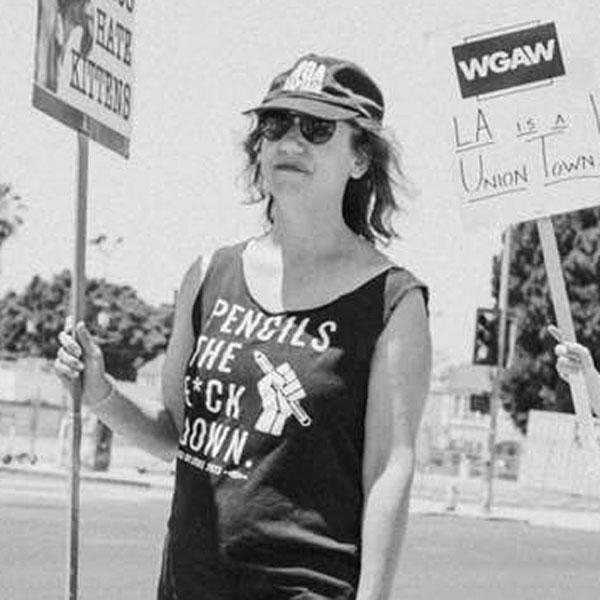Guaranteed second step provision of 2023 MBA is a long-awaited gain for screenwriters.
4/26/2024 • Evan Henerson
Ridiculousness Writers Negotiate First Contract
Newest WGAW members enjoyed support throughout contract campaign.
Guaranteed second step provision of 2023 MBA is a long-awaited gain for screenwriters.
At the conclusion of the 2023 WGA strike, WGAW members Andrew Rhymer and Scarlett Bermingham took an idea for a screenplay that they had been working on to New Line. Thanks to a provision of the newly ratified MBA, when the studio bought the feature—titled Big Time Abroad—the husband-and-wife writing team were pleased they would get more than a single pass at their script.

“Having a guaranteed second step clause allowed our agents a lot more leeway in terms of negotiation,” said Rhymer, a six-year WGAW member.
“And a lot more peace of mind for us,” added Bermingham who joined the Guild in the fall of 2023.
Screenwriters cite multiple reasons to celebrate the Guild’s winning a guaranteed second step for scripts under 200% of minimum in the latest MBA. Gone is the pressure a writer feels at having to nail that script on the very first attempt or worry about getting replaced. With a second step, a writer can be assured of a payment while addressing notes in a second draft. Since the provision applies to spec sales, writers who are paid under 200% of the minimum for a spec script—which is often the case for emerging writers—will also qualify for health and pension contributions for that sale. P&H contributions are payable on both the rewrite and the spec purchase when a writer is employed to perform a rewrite as part of a spec sale.
“With the guaranteed second step, it’s knowing or hoping that there won’t be some of that preciousness and natural fear from everyone, from producers, from us, from a director, from anyone,” said Rhymer who called the guaranteed second step provision a “massive win.” “Movies are expensive. You bring your draft in and literally anything can make the studio go ‘Uh…’”

“Our producers are super collaborative, but it feels like the nature of having a guaranteed second step just feels more collaborative,” agreed Bermingham.
With the second step guaranteed, writers like WGAE member Jane Barr are hopeful that pressure to do unpaid work will become less frequent.
“In my first project, they made me do a producer pass maybe four times before they moved on to the next step, and I complained,” said Barr, whose current deal for screenplay about the life of Josephine Baker includes a guaranteed second draft with an optional rewrite and polish. “Having to do free work makes me very resentful. That first experience was very hard because of that.”
“Having the second step guaranteed means that people can breathe a little easier,” said WGAW Vice President Michele Mulroney. “I’ve heard from a good handful of writers since we closed the deal who have gotten their first guaranteed second step deal and what a huge difference it makes to them to be able to plan financially, and to have that peace of mind to know they’ve got a couple of shots at getting this right. Psychologically as well as financially, it’s really important.”

Having the second step guaranteed means that people can breathe a little easier.
- Michele Mulroney
“Financially, it’s key,” agreed WGAW member Jeff Stockwell. “But the bigger reason for me is that the two-step deal really feeds well into the whole writing process, the process of getting feedback from the producers and executives you’re working for and then implementing that feedback. So it kinds of allows everyone in the circle to do what they’re supposed to do.”

The second step is required whenever a writer is hired for a first draft screenplay for 200% of minimum or less. (Click here for qualifying rates.) This is true of both original and non-original screenplays and also applies to spec purchases. It is not permitted to forego or opt out of the second step. Any writer who is encouraged to opt out should contact the Guild’s Agency Department.
Several screenwriters interviewed for this story said that the codifying of the second step represents a welcome move back to the days when multiple-step deals were standard rather than rarities. Cat Vasko recalled her days as an emerging writer with a single Black List script on her resume when she secured her first book adaptation in 2015.

“I’m this nothing nobody writer from nowhere, and I still got a two-step deal,” said Vasko. “It was invaluable, and not because it was so much more money. It was getting to be inside the process like that, sitting down with the studio executives at Lionsgate, hearing their feedback and understanding their concerns, hearing about budgetary issues and things that were totally opaque to me until I got to have this step in the process.”
“This was during the tail end of the glory days of the two-step deal, which I didn’t know at the time,” she continued. “I remember being shocked when my lawyer called me and said, ‘Yeah, we’ve got two steps. We advocated for three, but wound up at two.’ I said, ‘They’re going to give me two paychecks to take two runs at this?’ It was like a fairy tale!”
Tyler Ruggeri encountered a similar landscape at his first job in the industry when he worked at a small management company that represented writers and directors.

“Back then, nearly every script deal we made had an automatic second step, sometimes with other rewrites and polishes included,” Ruggeri said. “By the time I became a writer myself, that had gone away. Most of the offers I got at the start of my career were for a single draft at WGA minimum.”
Ruggeri has steered away from accepting one-step assignments. Stockwell has tried to do the same, but confessed that he has agreed to one-step deals and subsequently tried but was unable to get the studio to agree to a second step.
“There have been times, during the last 10 to 12 years when it’s become really rare to get two steps, you make the fight but you often don’t get the second step guaranteed,” Stockwell said. “There were times where I would still make the deal, depending on how tight things were financially. I wish I could be purely, ‘Screw you. I’m not doing it,’ but I can’t always.”
Stockwell further argued that writers getting multiple steps will result in “better, smarter” movies as studio executives will deliver their notes on early drafts and get to see them implemented by the people who wrote those drafts.
“As you’re emerging as a screenwriter, you want as many opportunities as you can to impress the people who are hiring you,” said Mulroney. “We all know that writing is an iterative process where there are multiple drafts before you get to the shooting script. The idea that you could nail this thing in one draft is very unrealistic, especially for an emerging writer.”
In 2020, in an Ask a Mentor column decrying one-step deals (“one of the biggest psychic thorns in my side,”) Stockwell urged his fellow WGA members to “make noise” speaking against these free work practices to representatives and studio executives alike.
Kind of like what we did in the new contract?
“Yes,” Stockwell said. “The Guild made beautiful noise.”
Following the Agency campaign, the Guild implemented a program of individual outreach to screenwriters around free work issues. We’ve counseled writers about the best way to resist producer passes based on their individual circumstances and launched the Project Page to assist writers in making informed decisions about the projects they pitch on.
Because there may not always be an enforcement option under the MBA, the surest way to avoid being taken advantage of is to say NO to free work.
The Guild is here to support you to resist demands for free work. Please reach out to Enforcement Specialist contact Shelagh Wagener in the Guild’s Agency Department if you are dealing with a free work issue, or would like to learn more about the Guild’s efforts in this area.